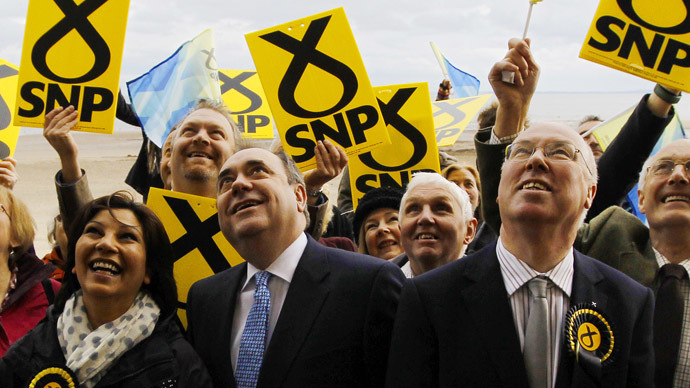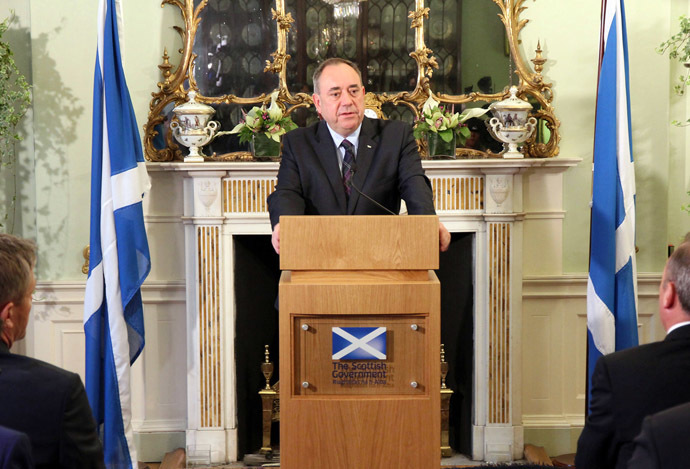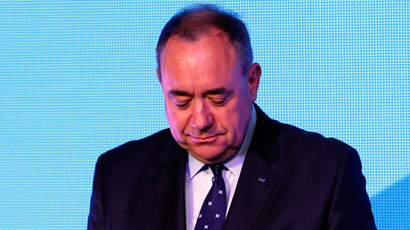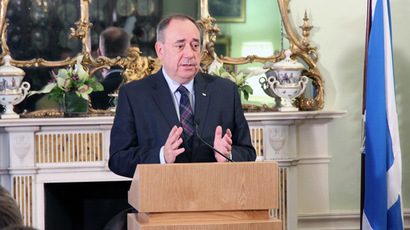66% jump in 4 days: SNP may become UK’s third biggest party

Nearly 17,000 people have swelled the ranks of Alex Salmond’s Scottish National Party (SNP) since the referendum vote last Thursday, putting the party’s membership ahead of the UK-wide Liberal Democrats.
Salmond’s ‘Yes Scotland’ campaign narrowly lost the vote for Scottish independence with 45 percent against the ‘No’ campaign’s 55 percent, from a record-breaking voter turnout of 84 percent.
Since the vote, Salmond has declared his intention to resign as Scotland’s First Minister. Yet SNP membership rocketed to 47,746 by Tuesday morning, compared to 25,642 at 5pm last Thursday. The 66 percent rise makes the SNP the UK’s third-biggest political party.
The shrinking membership of the Liberal Democrats, who share power in coalition with the Conservatives, stood at 43,451 at the start of this year, while Nigel Farage’s anti-EU party UKIP had 38,124 members on May 19.
Scotland’s Green Party, the only other major party to back independence, has also seen an additional 3,000 people join since the referendum.
The SNP released the figures ahead of the opening of the Scottish parliament, at which Salmond is expected to call for the voting age to be lowered to 16 before May’s general election.
The younger age group, enfranchised for the first time in UK history, voted overwhelmingly in favor of independence last week.
“With this influx of new members joining the SNP since the referendum – many of them from Labour’s heartlands – the Westminster establishment now face serious pressure to deliver on the substantial new powers for Scotland which the No camp promised during the campaign,” an SNP spokesperson said.

Just over a week before the referendum, the Conservatives, Labour and Lib Dems promised Scots more autonomy over tax and welfare spending if they chose to stay in the UK.
PM David Cameron said after Thursday’s result that constitutional reforms, including in Scotland, would not be delivered until after the 2015 UK general election, and that changes would be linked with those made to the UK as a whole.
Pro-independence Scots are keen to keep up the pressure on the UK government to deliver on its pledges. Others are demanding a second independence referendum at the earliest opportunity.
“Scotland’s referendum was an incredible triumph of democracy – and the new wave of democratic engagement and activism the Yes campaign inspired shows no signs of stopping,” said SNP Business Convener Derek Mackay, a member of the Scottish parliament.
Mackay said the Labour Party, which fronted the campaign against independence, would find their position in Scotland growing increasingly “precarious.”
“Ordinary Labour voters simply won’t forget Johann Lamont’s alliance with the Tories in the No campaign,” said Mackay.
“It is this new wave of democratic engagement which will hold the Westminster establishment to account on their vow of more powers for Scotland – people simply won’t accept the same old politics as usual from Westminster.”
Mackay said Westminster must to deliver on its pledges, or ‘No’ parties would “face the consequences at the ballot box.”
Thousands of pro-independence activists, determined to continue their fight for Scottish statehood, launched a new campaign called ‘the 45 percent’ with the aim of sustaining the grassroots movement’s momentum.
Tommy Sheridan, a former MSP and leader of Scotland’s socialist coalition, Solidarity, has urged ‘Yes’ supporters to back candidates who support independence and back another referendum in 2020. He says the SNP are the most likely of the major parties to deliver on this.
“Let's punish the reactionary and dishonest ‘No’ parties at the ballot box next May,” said Sheridan. “Let's punish the shameful Labour party in particular for siding with the bankers, bosses, billionaires and millionaires to try and crush our dream of a new and better Scotland with an avalanche of fear and lies.
“We have youth, energy and hope on our side. Hope can triumph over Fear in 2020,” he added.













